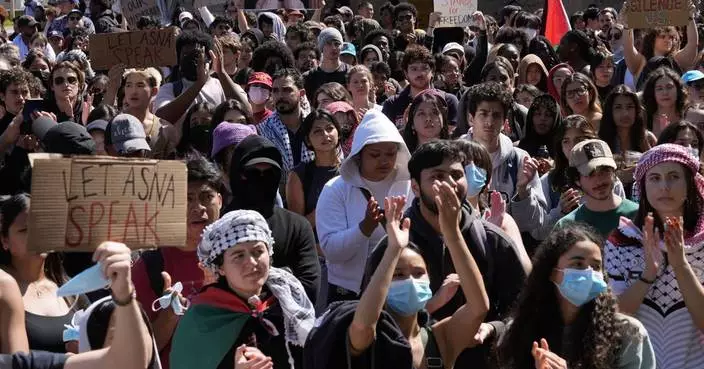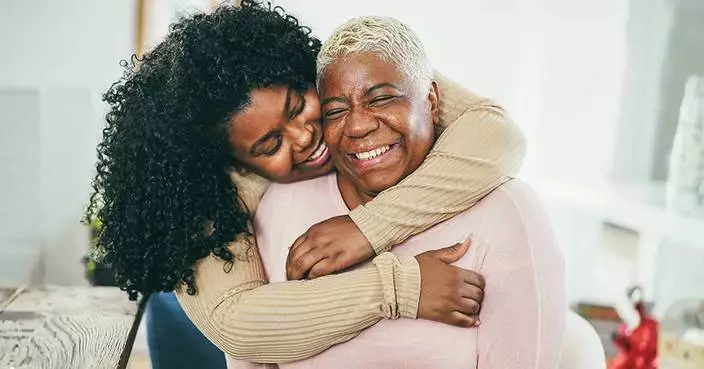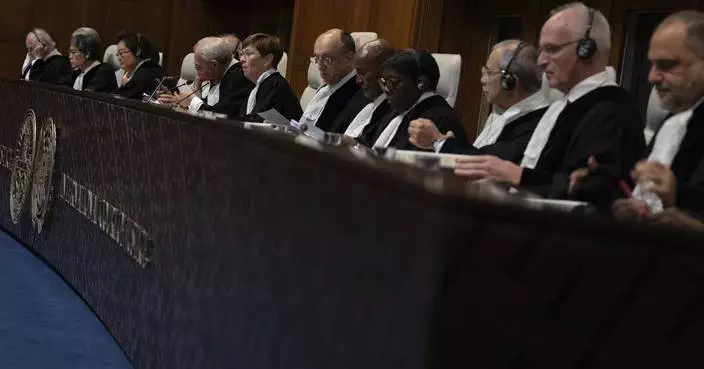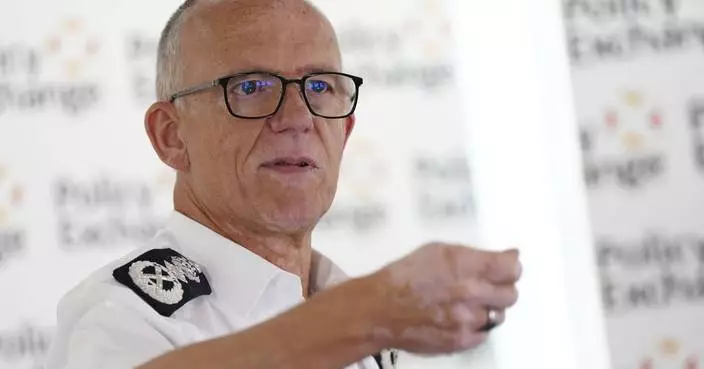Armenia's parliament rejected making the opposition lawmaker who led weeks of anti-government rallies the country's new prime minister Tuesday, prompting him to call for a nationwide strike in protest.
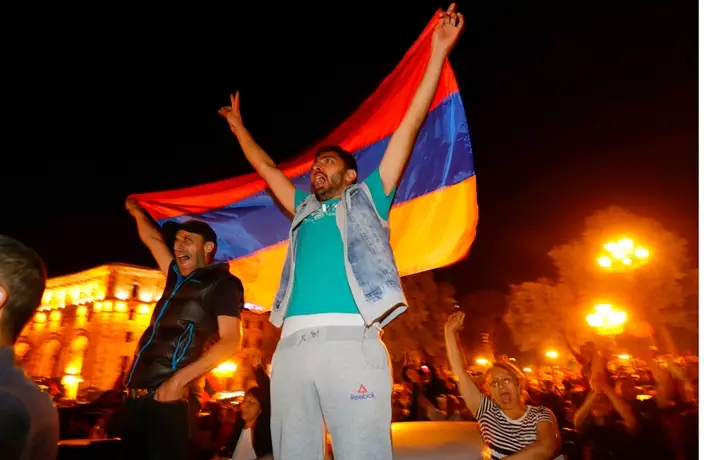
Supporters of the opposition lawmaker Nikol Pashinian hold a rally in the Republic square in Yerevan on Tuesday, May 1, 2018. (AP Photo/Sergei Grits)
After a nine-hour session, the National Assembly of Armenia voted 55-45 against appointing Nikol Pashinian. He was the only candidate nominated to replace long-time leader Serzh Sargsyan, who resigned as prime minister because of the protests.
Click to Gallery
Armenia's parliament rejected making the opposition lawmaker who led weeks of anti-government rallies the country's new prime minister Tuesday, prompting him to call for a nationwide strike in protest.
After a nine-hour session, the National Assembly of Armenia voted 55-45 against appointing Nikol Pashinian. He was the only candidate nominated to replace long-time leader Serzh Sargsyan, who resigned as prime minister because of the protests.
As Pashinian made his way through the crowd after the vote, his backers clapped and chanted his name until he reached the stage in Republic Square with his wife holding onto his arm.
The Armenian Constitution dictates that parliament will convene next week for another vote.
However, he pledged that the protest would remain non-violent, rejecting suggestions by members of the ruling party that he was encouraging divisions in the country.
Sargsyan led Armenia as president for 10 years until term limits forced him to step down and he was made prime minister in mid-April. The opposition saw the move as aimed at keeping Sargsyan in power indefinitely.
Republican deputies accused Pashinian of exploiting the young people who have been his core supporters. Some said Pashinian doesn't have a political platform to offer the country.
"The only thing that people on this square will accept is Pashinian's win, changes in the country and the ouster of the old clan," said engineer David Babayan, 47, who came to Republic Square with his wife and 10-year-old son.
Between 30,000 and 40,000 opposition supporters spent the day peacefully rallying outside the parliament building to support Pashinian. The vote's outcome upset many of them.
"They spat on us, but we're not going to tolerate this," bakery owner Samvel Rustamyan, 46, said while jeering and punching his fists in the air. "This government just won't resign on its own will. It's tens of thousands of us, and we need them to go."
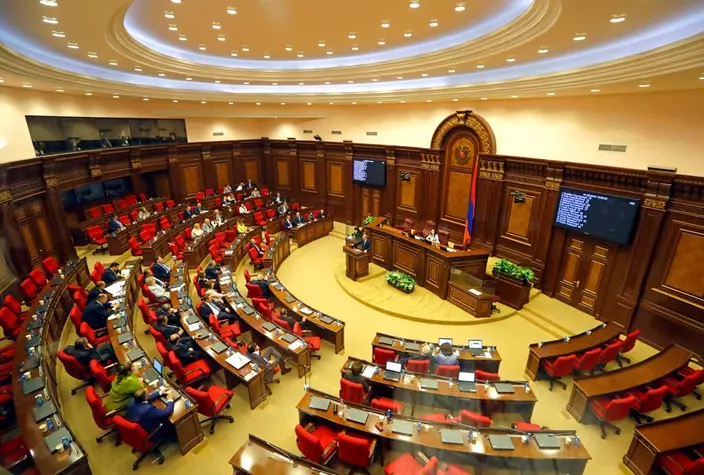
Opposition lawmaker Nikol Pashinian speaks during a parliament session to choose a replacement of Prime Minister in Yerevan on Tuesday, May 1, 2018. (AP Photo/Sergei Grits)
As Pashinian made his way through the crowd after the vote, his backers clapped and chanted his name until he reached the stage in Republic Square with his wife holding onto his arm.
Confetti flew over the square as if in celebration as Pashinian urged his supporters to strike and to block all major roads and access to the Yerevan airport to protest the vote's outcome. The crowd's mood was jubilant despite the setback, as a light show lit up the rally and people shined flashlights from their cellphones.
"The peaceful revolution goes on. We're not going to let them steal our victory," a hoarse Pashinian said. "We are starting large-scale actions of civil disobedience tomorrow."
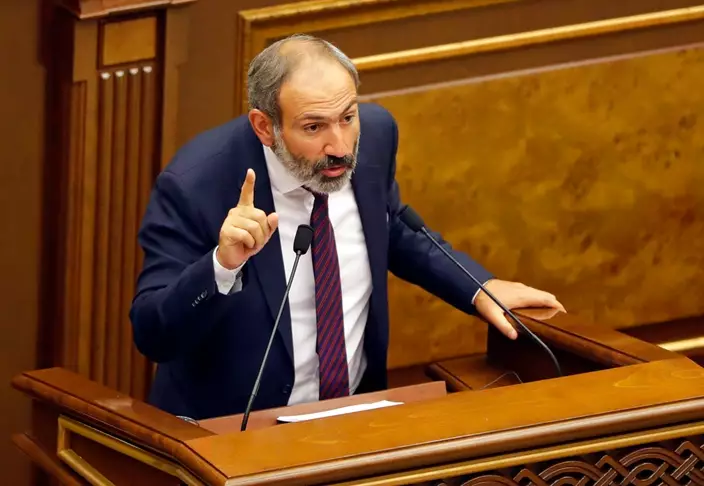
Opposition lawmaker Nikol Pashinian speaks during a parliament session to choose a replacement of Prime Minister in Yerevan on Tuesday, May 1, 2018. (AP Photo/Sergei Grits)
The Armenian Constitution dictates that parliament will convene next week for another vote.
Hours earlier, Pashinian warned his colleagues in parliament that this Caucasus Mountains country would be roiled by "a political tsunami" if the majority party didn't support him.
"Your attempts to interpret the tolerance of the popular movement as weakness could cause unexpected and undesirable consequences," Pashinian said, addressing members of the ruling Republican Party. "Get sober until it's too late, because your behavior could cause a political tsunami."
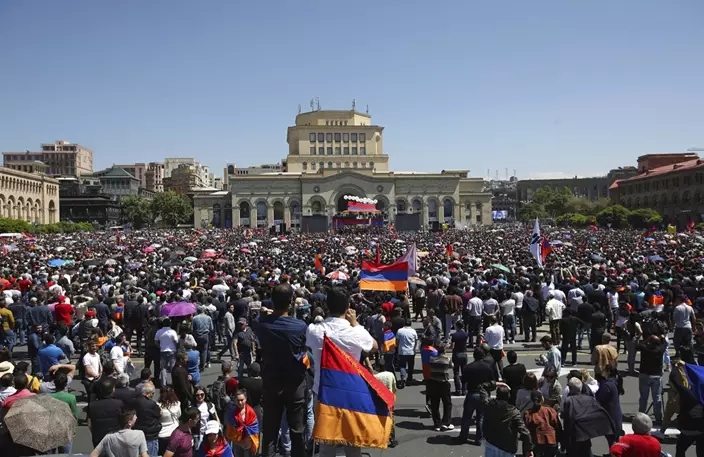
Supporters of the opposition lawmaker Nikol Pashinian gather for a rally at the Republic square in Yerevan on Tuesday, May 1, 2018. (AP Photo/Thanassis Stavrakis)
However, he pledged that the protest would remain non-violent, rejecting suggestions by members of the ruling party that he was encouraging divisions in the country.
It's "people on one side and 20-25 Republican party members on the other," he said.
But some warned that Tuesday's vote might spark violent protests despite Pashinian's pledges.
"Authorities' actions are pushing the opposition to radicalize, and this movement might spill into violence," Vigen Akopyan, a political analyst in Yerevan, said. "Pashinian won't be able to keep the protest peaceful for long. People are very angry."
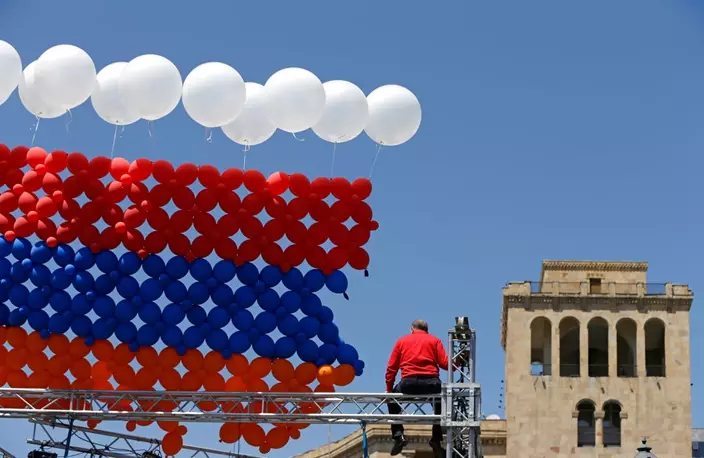
A man sits on top of the gantry of a stage during a break in a rally at the Republic square in Yerevan on Tuesday, May 1, 2018. (AP Photo/Thanassis Stavrakis)
Sargsyan led Armenia as president for 10 years until term limits forced him to step down and he was made prime minister in mid-April. The opposition saw the move as aimed at keeping Sargsyan in power indefinitely.
After nearly two weeks of street protests led by Pashinian, Sargsyan resigned.
While Pashinian was the only candidate nominated to be the next prime minister before Tuesday, the National Assembly is controlled by Sargsyan's Republicans. Not a single Republican lawmaker appeared to have voted for him.
Before the vote, lawmakers grilled Pashinian during a question-and-answer session. Later, dozens of them took the floor to speak about Pashinian's candidacy.
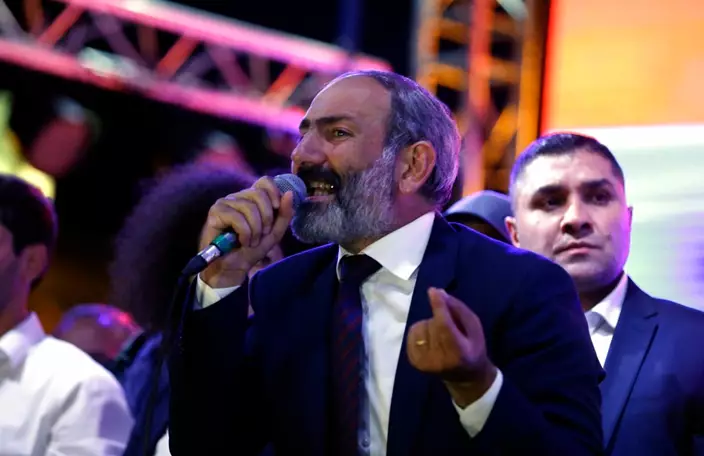
Opposition lawmaker Nikol Pashinian speaks during a rally in the Republic square in Yerevan on Tuesday, May 1, 2018. (AP Photo/Thanassis Stavrakis)
Republican deputies accused Pashinian of exploiting the young people who have been his core supporters. Some said Pashinian doesn't have a political platform to offer the country.
"I was hoping to hear a conceptual speech of a candidate for the prime minister, but instead I was witness to a non-program speech which sounds pleasant to people's ears," senior Republican party member Eduard Sharmazanov told the chamber.
Opposition members of parliament joined Pashinian in warning that a vote against him would be a vote against the tens of thousands of people who joined the anti-government rallies in recent weeks.
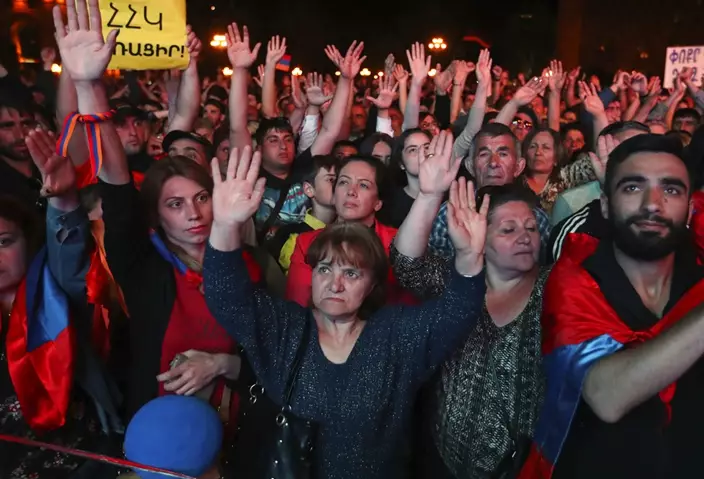
Supporters of the opposition lawmaker Nikol Pashinian hold a rally in the Republic square in Yerevan on Tuesday, May 1, 2018. (AP Photo/Thanassis Stavrakis)
"The only thing that people on this square will accept is Pashinian's win, changes in the country and the ouster of the old clan," said engineer David Babayan, 47, who came to Republic Square with his wife and 10-year-old son.
The vote against Pashinian might be a deliberate tactic of the Republican party to get the opposition to meet some of its demands half-way. The party did not put forward its own candidate or say beforehand how its lawmakers would vote.
"Authorities have decided to bide for time, trying to get the opposition to offer concessions," Alexander Iskanderian, director of the Caucasus Institute in Yerevan, said. "Authorities will obviously want to secure guarantees of immunity from prosecution and seats in a new government."
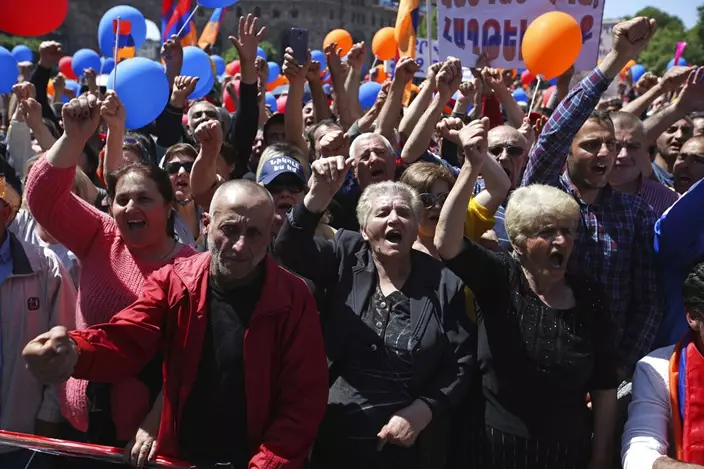
Supporters of the opposition lawmaker Nikol Pashinian shout slogans during a rally at the Republic square in Yerevan on Tuesday, May 1, 2018. (AP Photo/Thanassis Stavrakis)
NEW YORK (AP) — Months before they pitched their tents on Columbia University's main lawn, inspiring a wave of protest encampments at college campuses nationwide, a small group of pro-Palestinian student activists met privately to sketch out the logistical details of a round-the-clock occupation.
In hours of planning sessions, they discussed communications strategies and their willingness to risk arrest, along with the more prosaic questions of bathroom access and trash removal. Then, after scouring online retailers and Craigslist for the most affordable options, they ordered the tents.
“There’s been a lot of work, a lot of meetings that went into it, and when we finally pulled it off, we had no idea how it would go,” said Columbia graduate student Elea Sun. “I don’t think anyone imagined it would take off like it did.”
Those involved with the Columbia protest, also known as the “Gaza Solidarity Encampment,” describe their organizing efforts as both meticulously planned and heavily improvised. They say the university’s heavy-handed attempts to quell the movement have only lent it more momentum.
Basil Rodriguez, a Columbia student affiliated with Students for Justice in Palestine, a group the university suspended in November, said organizers had been in touch with students at other schools about how to erect their own encampments. About 200 people joined one call with students on other campuses.
To attract the most news media attention, the organizers timed the Columbia encampment to coincide with university president Minouche Shafik's testimony last Wednesday to a congressional panel investigating concerns about antisemitism at elite colleges.
The following day, officers with the New York police department flooded the campus, dismantled the tents, arrested more than 100 activists, and threw out their food and water. Shafik said she had taken the “extraordinary step” of requesting police intervention because the encampment had disrupted campus life and created a “harassing and intimidating environment" for many students.
That decision fueled currents of rage that quickly washed across the country, prompting students at other college campuses to set up their own protest encampments.
“We’re standing here today because we’re inspired by the students at Columbia, who we consider to be the heart of the student movement,” Malak Afaneh, a law student and spokesperson for the 100-student-strong encampment at the University of California, Berkeley, said Tuesday.
Just hours after last week's arrests, some Columbia students jumped a fence to an adjacent lawn, wrapping themselves in blankets until a new provision of tents eventually arrived. In the week since police cleared the first encampment, the second iteration has grown not only larger, but more organized.
“The university thought they could call the police and make the protesters go away. Now we have twice as many protesters,” said Joseph Howley, an associate professor at Columbia and supporter of the encampment. “The students have experienced a ratcheting up of repression that has prompted them to escalate with their own tactics now.”
The mood was lively and upbeat on Wednesday, as some students passed out matzo leftover from a Passover seder and knafeh, a flaky Middle Eastern pastry dropped off by a supportive Palestinian family from New Jersey.
Others attended a teach-in delivered by a Columbia alumnus involved in the anti-apartheid movement in the 1980s, pulled books off the shelf of a “People’s Library,” and helped themselves to art supplies from a craft table. Those who’d spent the night in one of roughly 80 tents said they used the bathrooms at nearby university buildings. (An earlier experiment with a “camp toilet” had been quickly abandoned.)
At the nearby law library, a group of negotiators representing the protesters has been meeting intermittently with university administrators since Friday to discuss their demands, which include cutting financial ties with Israel and the companies involved in the war in Gaza, as well as amnesty for students and staff facing discipline for participating in the protests.
Those talks broke down on Tuesday night, according to the lead negotiator, Mahmoud Khalil, after he said the university threatened to send in police and the National Guard if the encampment wasn’t gone by midnight. Hundreds of students and faculty quickly packed onto the lawn in the largest numbers since the start of the demonstration.
Overnight, the university backtracked, giving demonstrators a 48-hour extension if the group agreed to block nonstudents from the encampment and remove a certain number of tents. A spokesperson later denied that the university had suggested calling the National Guard.
While there have been confrontations and allegations of antisemitic activity outside the university’s gates, police described students inside the encampment as peaceful and compliant.
Organizers said they’d dismantled a few tents for fire safety reasons, but were still admitting outsiders to the encampment as long as they abided by community guidelines, including: no photographs, littering or engaging with counter-protesters. They said they had no plans to leave until their demands were met.
Opponents of the encampment say it has destabilized campus life, forcing the university to barricade many of its entrances to nonstudents while putting Jewish students in harm’s way.
Omer Lubaton Granot, a graduate student from Israel who is studying for a master's degree in public administration at Columbia, said the university should have taken “more assertive action” in clearing the encampment. He accused protesters of embracing an aggressive anti-Zionist stance that made him feel unsafe.
“They’re canceling my identity and they’re threatening me as an Israeli and as a Jew,” he said.
Officials including President Joe Biden and Democratic New York Gov. Kathy Hochul have also condemned what they described as antisemitism associated with the protests. On Wednesday, Republican House Speaker Mike Johnson held a news conference at Columbia to denounce the encampment, drawing jeers from many students.
Mayor Eric Adams, a Democrat, noted this week that many of the students were sleeping in the same brand of tents, which he said could indicate that “outside agitators” were responsible for arranging the encampment, a baseless claim that had earlier spread among some right-leaning news media outlets and New York police officials.
Layla Saliba, a Palestinian American student at Barnard, Columbia's sister college that shares some facilities with the university, dismissed the idea. She said the students leading the protest were mostly “nerds” who enjoyed lengthy meetings and consensus building.
“To imply this is AstroTurfed or paid off, when it has actually been students laying the groundwork for this from the very beginning, is ridiculous,” she said.
As for the similarity of the tents, she said the brand had been ordered in bulk by student organizers. As the encampment has expanded, students have brought their own camping gear, she said, pointing to the varied sleeping arrangements on the bustling lawn.
“There’s apparently a lot of people here at Columbia who like to camp,” she added. “I’ll admit I was a bit surprised by that.”
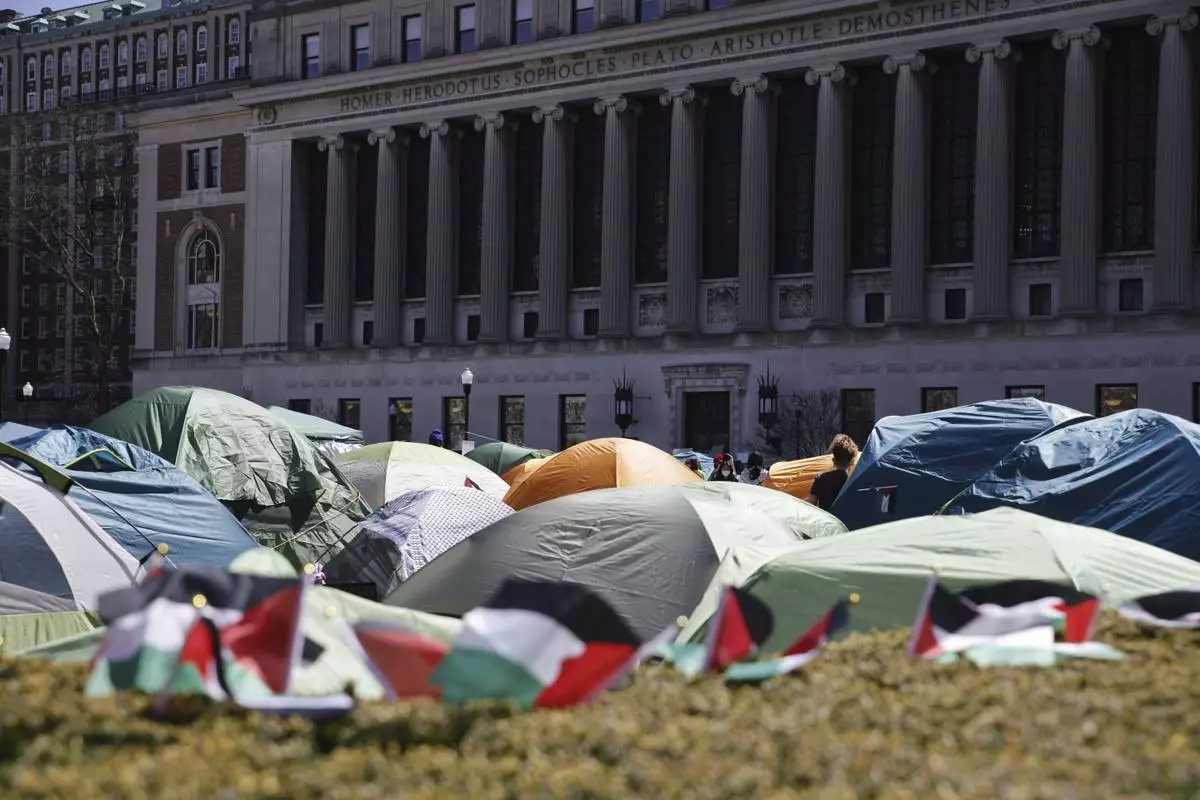
Tents are erected at a pro-Palestinian demonstration encampment at Columbia University in New York, Monday April 22, 2024. (AP Photo/Stefan Jeremiah)
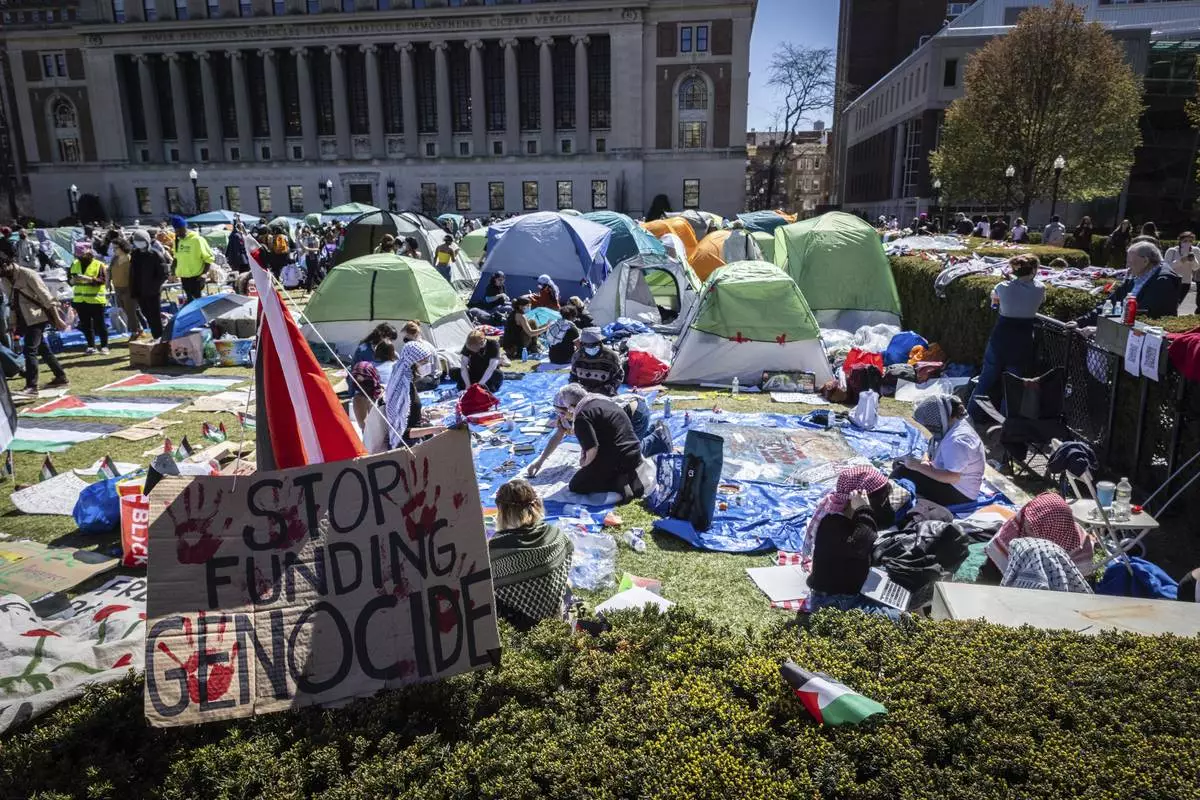
A sign sits erected at the pro-Palestinian demonstration encampment at Columbia University in New York, Monday, April 22, 2024. (AP Photo/Stefan Jeremiah)
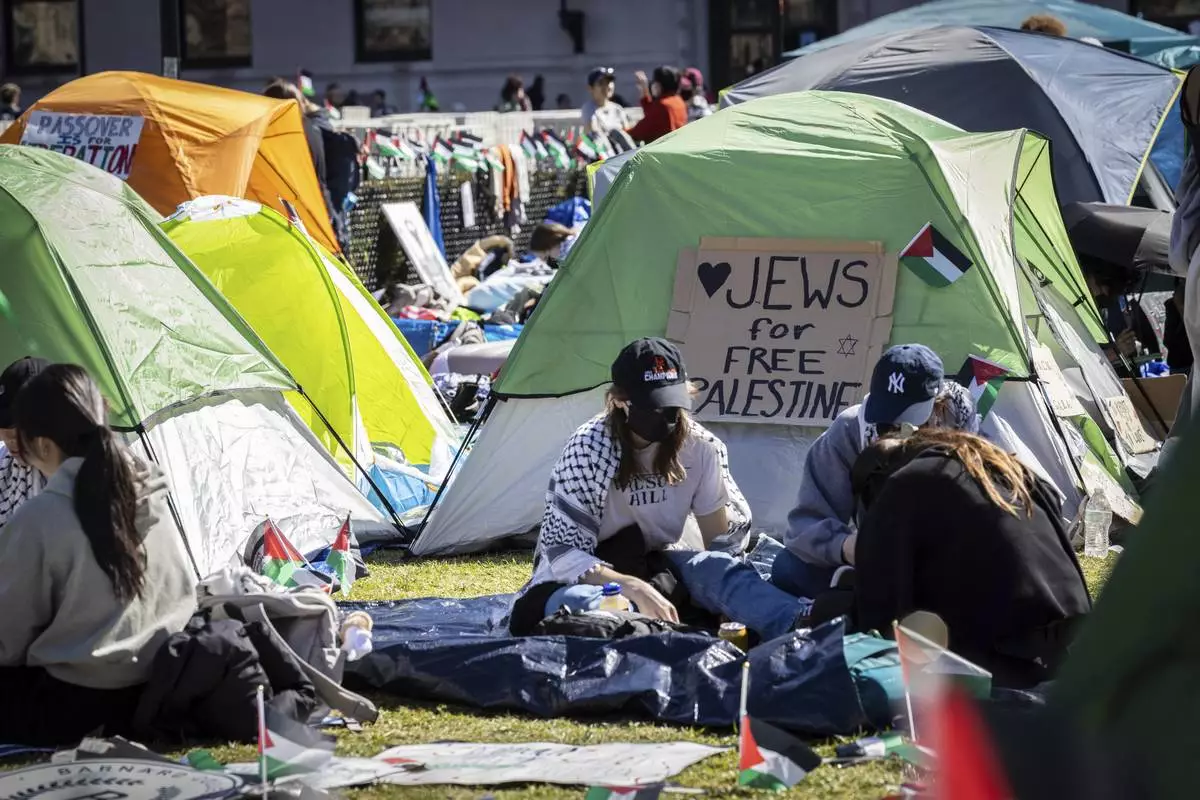
Student protesters sit in front of a tent during the Pro-Palestinian protest at the Columbia University campus in New York, Monday April 22, 2024. (AP Photo/Stefan Jeremiah)
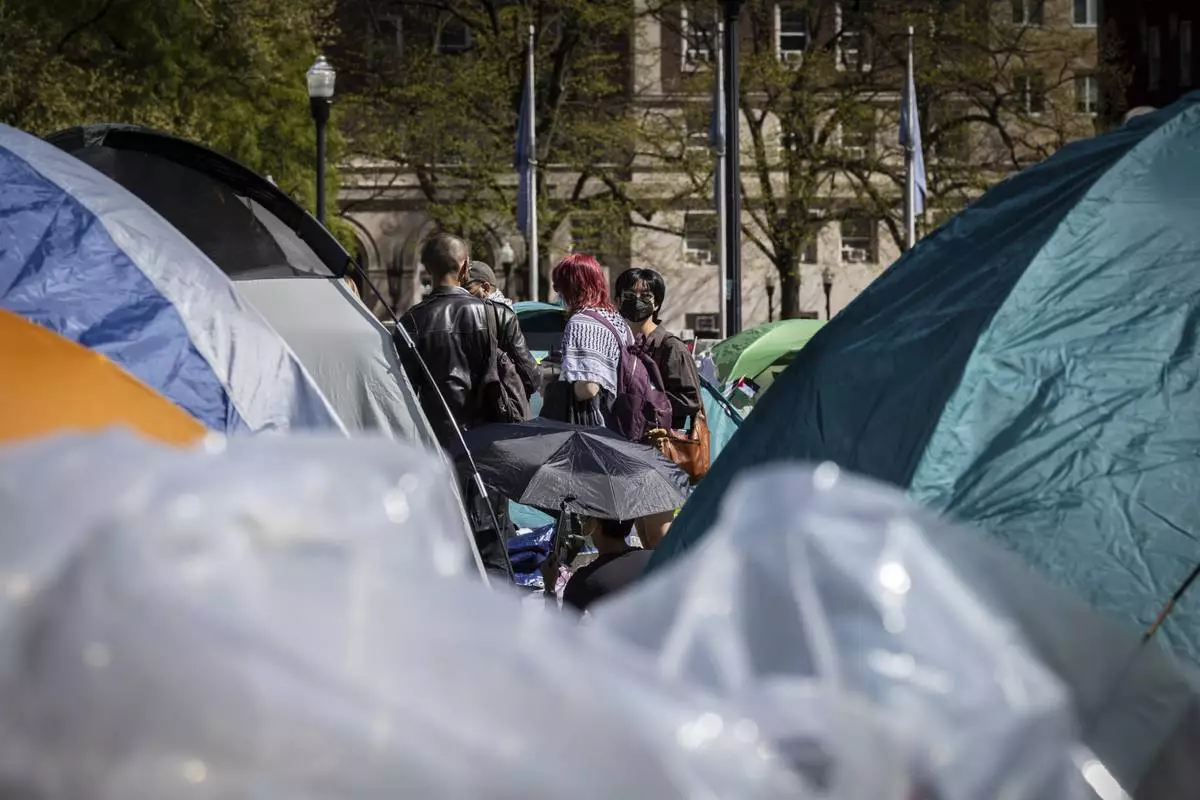
A student protester sits among the tents erected at the Pro-Palestinians protest at the Columbia University campus in New York on Monday April 22, 2024. (AP Photo/Stefan Jeremiah)
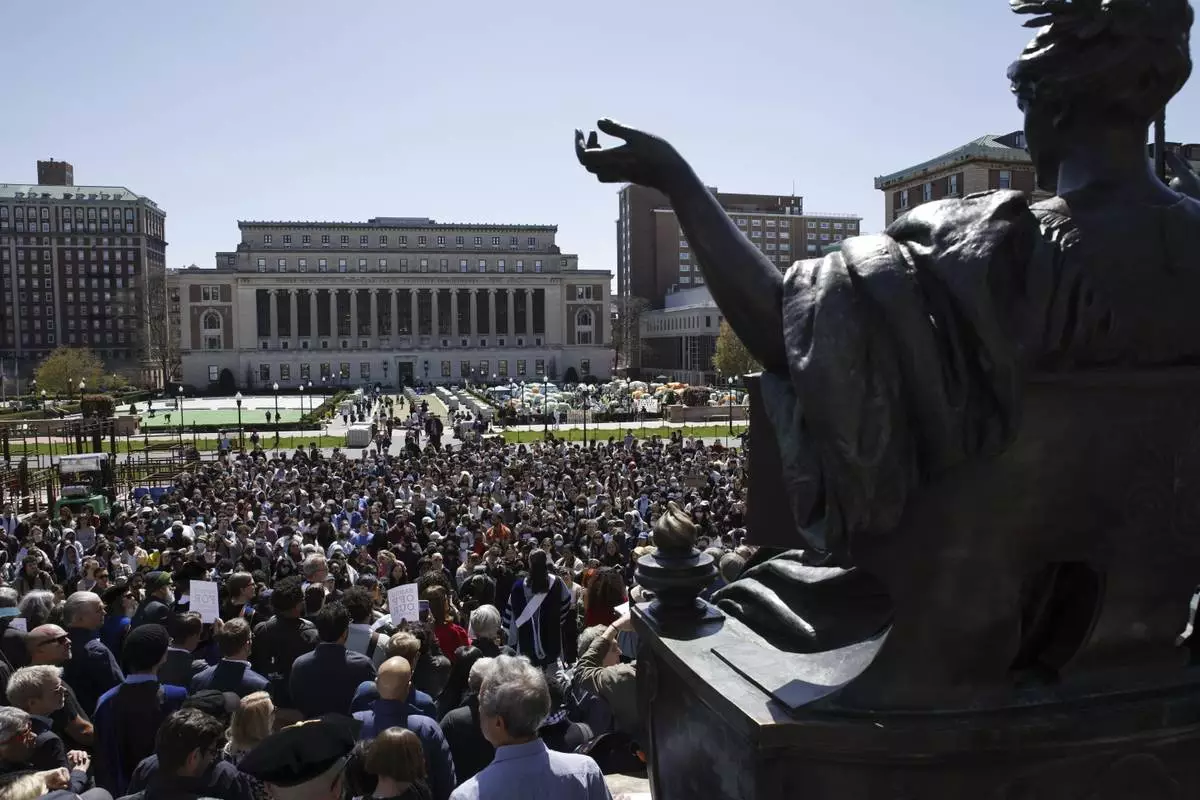
Columbia University professors speak in solidarity with their students rights to protest free from arrest at the Columbia University campus in New York on Monday April 22, 2024. (AP Photo/Stefan Jeremiah)
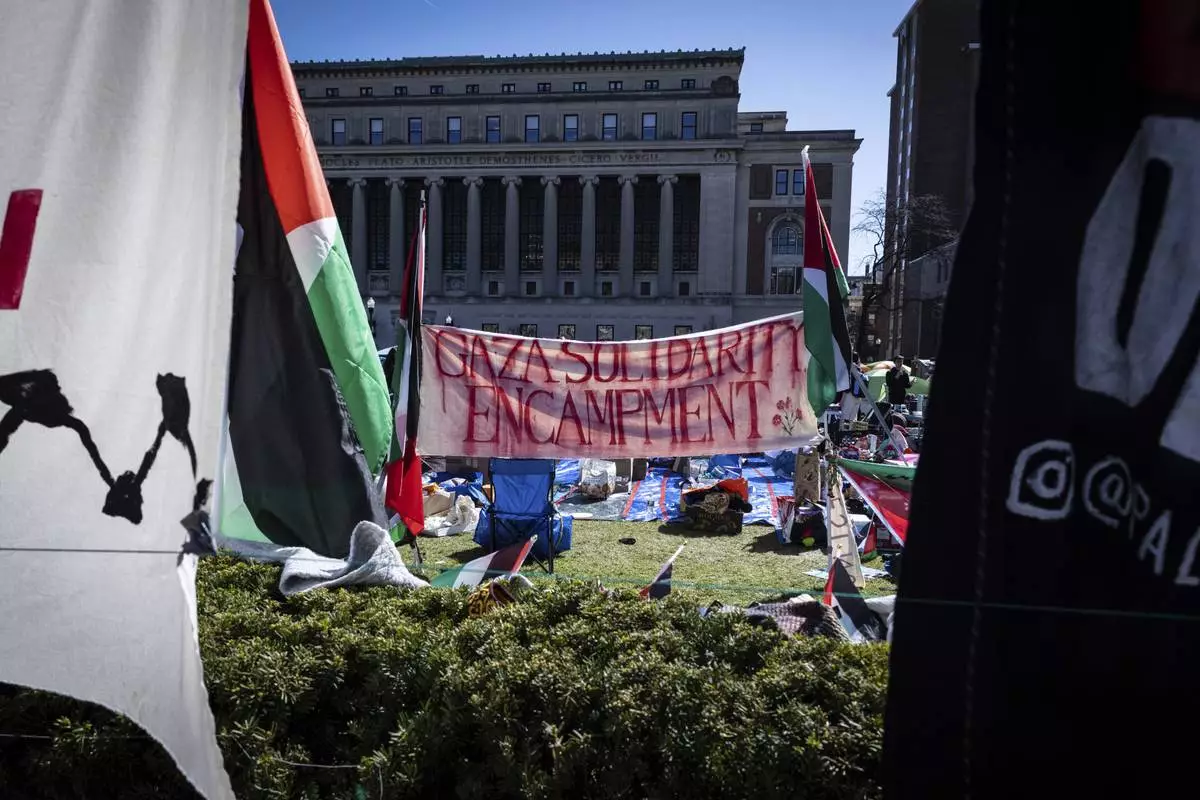
A sign that reads, Gaza Solidarity Encampment, is seen during the Pro-Palestinians protest at the Columbia University campus in New York, Monday April 22, 2024. (AP Photo/Stefan Jeremiah)

















